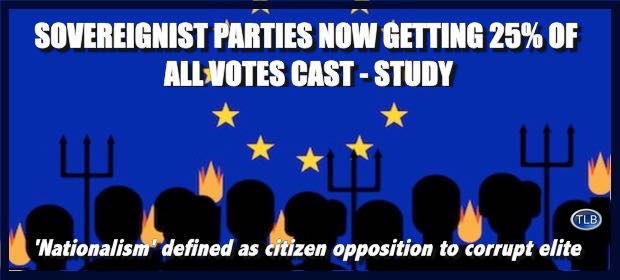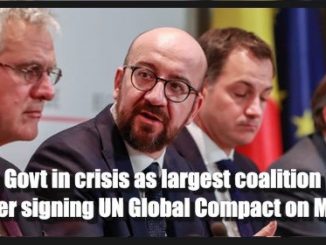
Support for EU sovereign parties tripled in two decades
Sovereignist parties in Europe have been pushed to the fringes of mainstream politics, but despite being constantly ostracized, humiliated and vilified by the media, their support in elections over the past two decades have risen meteorically.
FREEWEST MEDIA
BRUSSELS – A study out on Tuesday by the Guardian newspaper showed how voting results for sovereignist parties in 31 European countries increased from 7 percent in 1998 to a quarter of all ballots cast this year.
The study comes months before the next elections to the European Parliament in May 2019. The previous vote in 2014 saw nationalist and Eurosceptic parties gain ground in the 751-seat legislature.
The research, in which 30 political scientists took part, identifies nationalism as a political strategy that opposes voters to a corrupt elite in order for the will of the ordinary man to triumph.
Sovereignist parties from across the political spectrum have been making large gains on the continent, with ultra-conservatives emerging as the winners, the study found.
The researchers maintain that the trend started in Eastern Europe and then gradually spread westward over the past three years. Currently sovereignist leaders are in power in at least 11 countries.
 European Union President Donald Tusk (pictured) warned this month that nationalist sentiment will lead to a “fundamental threat” in the EU ahead of legislative elections next year. But he confused a concern over German Chancellor Merkel’s immigration policies with the European project in general.
European Union President Donald Tusk (pictured) warned this month that nationalist sentiment will lead to a “fundamental threat” in the EU ahead of legislative elections next year. But he confused a concern over German Chancellor Merkel’s immigration policies with the European project in general.
“I wish to clearly emphasize here that I see no coincidence in the fact that in virtually all of Europe, whether openly or more discreetly, those who are enthusiastic about Brexit, those who are more or less enthusiastic about Washington’s further steps towards isolationism, those who are flirting with Vladimir Putin with increasing intensity, they are all attempting, also more or less unambiguously, to persuade us that the European Union in general, or in its current shape, has no future,” Tusk said in a speech in Poland.
“The problem is that today, those who are cheering on nationalism in Europe, those who are betting on disintegration and conflict, will inevitably lead to an absolutely fundamental threat,” Tusk said.
“I am talking here about the rise of nationalism and anti-European, not only rhetoric, but also anti-European emotion, in many European capitals,” he said. “This does not yet apply to today’s leaders, but these forces are growing before our very eyes. They are forces which back conflict rather than cooperation, disintegration rather than integration,” Tusk said.
CONTINUE READING HERE
ER recommends other articles by FreeWest Media




